#mica levi
Text


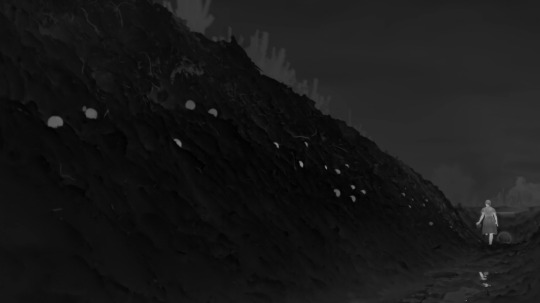
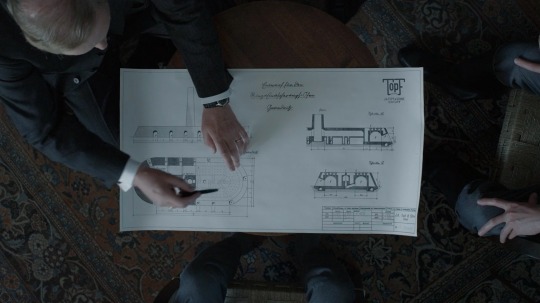


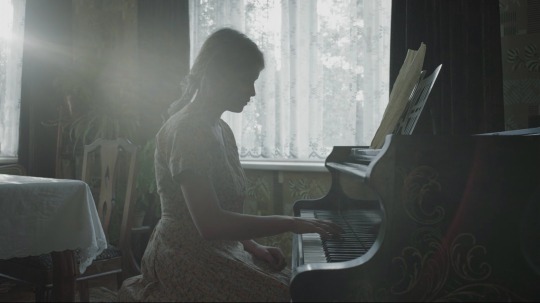
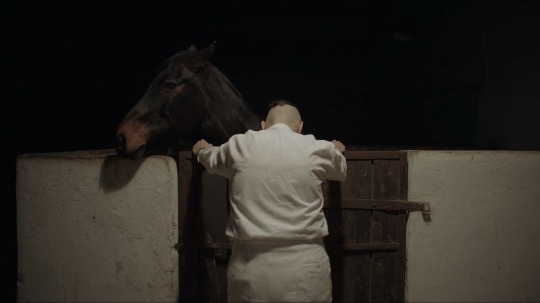


"The life we live is very much worth the sacrifice."
The Zone of Interest (2023) dir. Jonathan Glazer
#the zone of interest#jonathan glazer#christian friedel#sandra hüller#dp: łukasz żal#johnnie burn#mica levi#films#film stills#screencaps#cinema#cinematography#cannes 2023
258 notes
·
View notes
Text

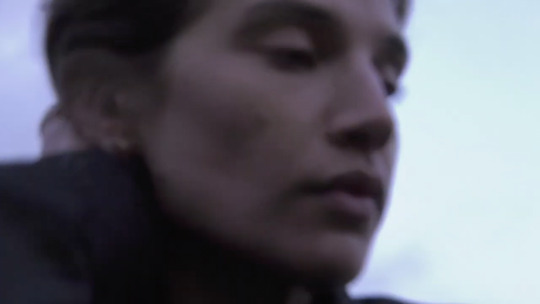
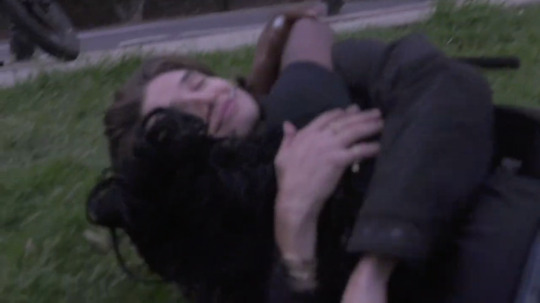
stills from a redacted Tirzah video dir. Dean Blunt
62 notes
·
View notes
Text

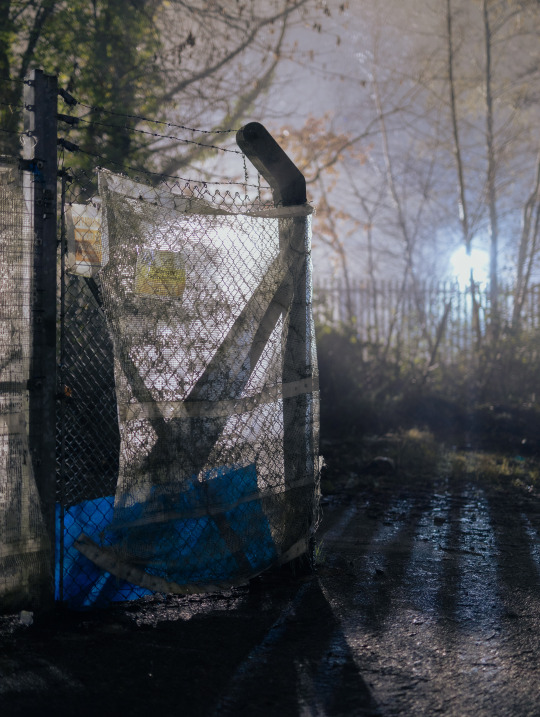
Shoegaze post-punk dreamscape
#photographers on tumblr#original photographic works#ken marten#spotify playlist#Nabihal Iqbal#FOG#Skalpel#Iggy Pop#Tarwater#Moin#Parquet Courts#Perfume Genius#Tuxedomoon#king krule#cocteau twins#mount kimbie#Gang Gang Dance#Charlie Megira#mica levi#Nathan Mcay#John Carpenter#uh#Metronomy#Alex Kassian#Jesus Loves You#Paul Oakenfold#The Grid#Andrew Weatherall#elizabeth fraser#gwenno
28 notes
·
View notes
Text

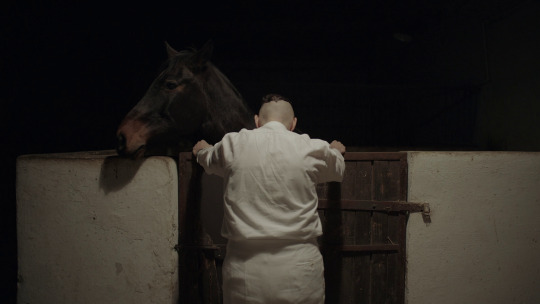
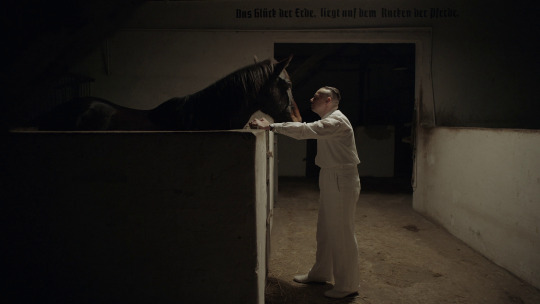


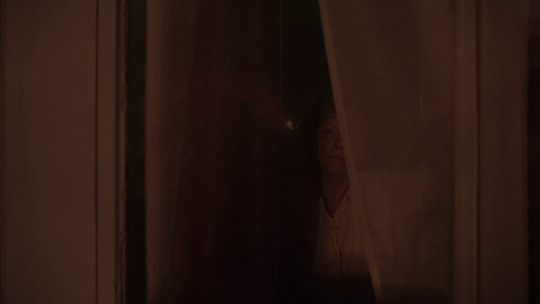
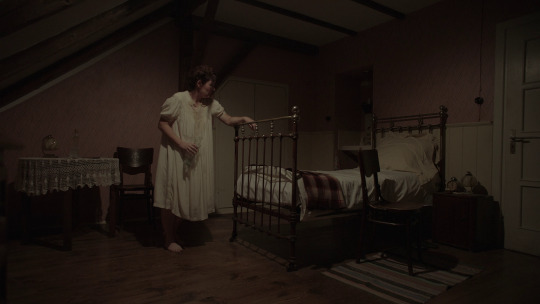
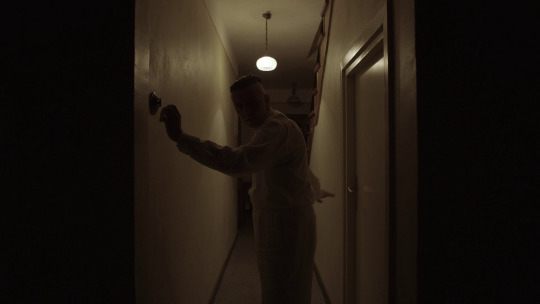
The Zone of Interest
Jonathan Glazer
2023
#martin amis#literature#film#cinema#masterpiece#mica levi#great sound design#great directors#great cinematography#Sandra Hüller#Christian Friedel#Łukasz Żal#Johnnie Burn#Jonathan Glazer#The Zone of Interest
22 notes
·
View notes
Text
ORIGINAL SCORE
Shortlisted: The Boy and the Heron / Eileen / Occupied City / Oppenheimer / Queens of the Qing Dynasty / Scarlet / A Thousand and One
THE NOMINEES ARE:

CHILE '76
Original Score by Mariá Portugal

KILLERS OF THE FLOWER MOON
Original Score by Robbie Robertson
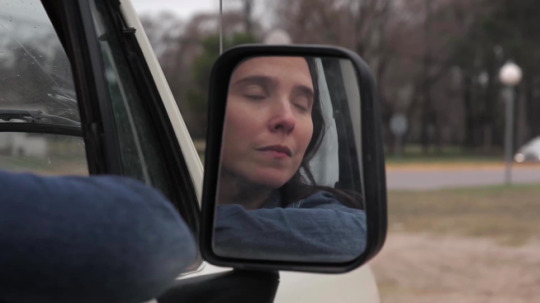
TRENQUE LAUQUEN
Original Score by Gabriel Chwojnik

THE ZONE OF INTEREST
Original Score by Mica Levi
AND THE CRISTAL GOES TO...

POOR THINGS
Original Score by Jerskin Fendrix
#2023 Film Awards#Best Original Score#Jerskin Fendrix#Poor Things#Mariá Portugal#Chile '76#Robbie Robertson#Killers of the Flower Moon#Gabriel Chwojnik#Trenque Lauquen#Mica Levi#The Zone of Interest
7 notes
·
View notes
Photo

Mica Levi (Micachu)
Gender: Non-Binary (they/them)
Sexuality: Queer
DOB: 28 February 1987
Ethnicity: White - English
Occupation: Singer, songwriter, musician, music producer, composer
#Mica Levi#Micachu#enby#nb#lgbtq#non binary#queer#1987#white#english#singer#songwriter#musician#music producer#composer#popular#popular post
116 notes
·
View notes
Text
Fuori (dal) campo.
La sceneggiatura è costruita dal suono, mura come divisorie fra vita e morte, mura sonore a pieno schermo, con il sangue che esce dalle orecchie di un buio schiacciante. Assomiglia all'Orrore (È questo il modo in cui finisce il mondo / Non già con uno schianto, ma con un piagnisteo - Eliot). L'edilizia floreale di un angolo di paradiso all'inferno, extra luminoso. Mentre i camini bruciano senza sosta e la cenere impone un contrasto elevato il candore agghiacciante è nei luoghi, negli abiti di Rudolf Höss ("Non lasciate che io mi avvicini nel regno di sogno della morte / Lasciatemi indossare / Travestimenti ricercati" Eliot), nelle parole di un lavoro come se fosse qualsiasi, nella candeggina fittizia che ricopre le anime marcescenti al di qua dei forni.
Glazer mette in scena il film definitivo sull'Olocausto, omettendo tutto il possibile, puntando il dito senza la retorica del non sapevo o lo ignoravo, perché chi ha visitato e visto i campi ha sentito l'odore della carne, ha visto i luoghi e le fornaci, ma non ha mai udito il sonoro della morte. Un volume monolitico. E se per 2001 di Kubrick era l'inizio di un'odissea, per Glazer (con Mica Levi) è la testimonianza definitiva della soluzione finale a cui è giunto l'uomo nel suo viaggio conradiano.
E mentre l'anima marcisce il corpo espelle liquidi improvvisi, anch'esso impossibilitato a sopportare l'Orrore, perché divisa l'anima, possa almeno essa stessa essere evacuata, recisa, gassata, vomitata.
[la zona d’interesse, Jonathan Glazer, Gran Bretagna, Polonia, USA, 2023]
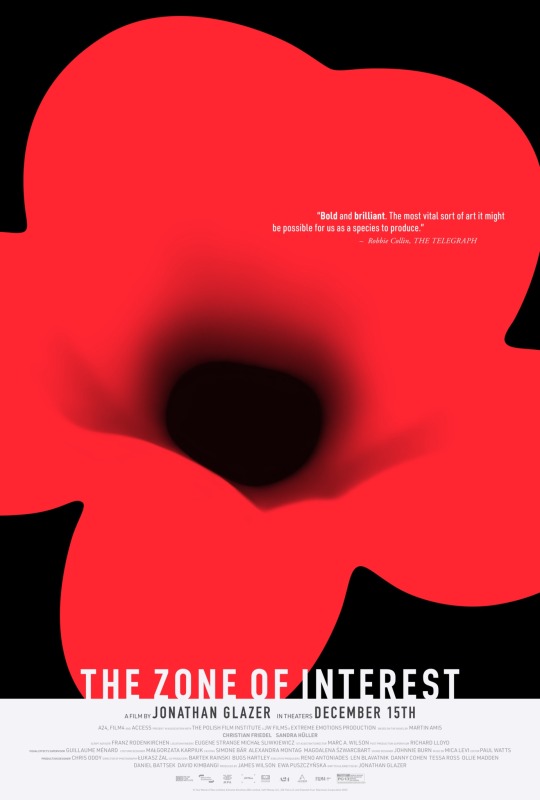
#william dollace#movie#film#recensione#cinema#jonathan glazer#the zone of interest#oscar 2024#la zona di interesse#mica levi#stanley kubrick#soundtrack
6 notes
·
View notes
Text
Rainy Miller & Space Afrika - "Maybe It's Time to Lay Down the Arms"
A Grisaille Wedding [Fixed Abode, 2023]
7 notes
·
View notes
Text

Mica Levi – Under The Skin
#mica levi#under the skin#soundtrack#vinylrecords#vinyl records#my vinyl#vinylcollection#experimental music#electronic music
6 notes
·
View notes
Text
Under The Skin (2013) is strange, hypnotic, brutal, and harrowing. Content warning for sexual violence. Scarlett Johansson proves she’s a master of her craft with a truly chilling performance. I saw one review suggest Jonathan Glazer may succeed Stanley Kubrick and, while I don't agree, I can see how they got there. I was particularly impressed with the score by Mica Levi. In some parts, the melodic expressiveness reminds me of some 60s and 70s scores, but in others, the use of synthetic bends is definitely a precursor to the climactic scenes in Annihilation (2018). This film is a work of art, and like lots of art, it wasn’t created to make you feel good. In fact, I’d be very suspicious if you left it feeling good. It’s deeply unsettling.

#film#movies#sci fi#horror#under the skin#scarlett johansson#jonathan glazer#stanley kubrick#mica levi#annihilation
5 notes
·
View notes
Text
youtube
This Arca mixtape isn't on streaming (presumably bc sample clearance issues?) but it's probably her best imo. Also shoutout mica levi, they did the Zone of Interest score which is unreal. Btw I got into Arca in 2015 when Tiny Mixtapes reviewed Mutant which is like my one claim to experimental music cred as a teenager.
5 notes
·
View notes
Text


45 notes
·
View notes
Text
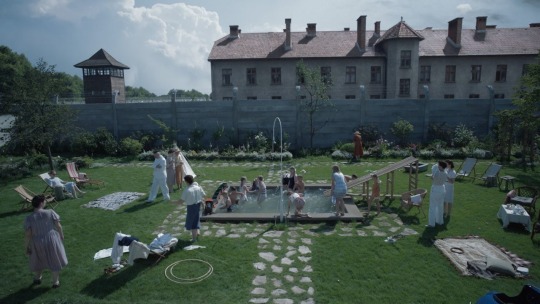
The Zone of Interest (2023, United Kingdom/Poland)
Over the last decade, English director Jonathan Glazer questioned whether it was appropriate for him to make a Holocaust movie from a Nazi perspective. Glazer, who comes from a Jewish family in north London, said that his family never spoke about the Holocaust at home, but it nevertheless loomed over their lives. His late father, when learning about Glazer’s decision to adapt Martin Amis’ novel The Zone of Interest, expressed disapproval. Yet Glazer forged ahead, his vision now complete.
I am no expert in the area of Holocaust cinema (of which there is a growing and always-controversial history) and do not profess to be a specialist of the Holocaust or Nazism. Nevertheless, I do believe it is possible to make a moral Holocaust narrative film from a Nazi point of view. Does Glazer succeed in doing so? That is a question that still perplexes me, and I am not sure if I can provide any satisfying answer. Given Glazer’s moral agonizing while making and within the visuals of this film, I am not sure if he knows either. So while I will still attempt to engage with the morality of The Zone of Interest (which, by many accounts, resembles little of Amis’ novel), this write-up’s premise will concentrate on two of the film’s goals as stated by Glazer himself.
The first is to immerse the viewer into the psychologies of Auschwitz concentration camp commandant Rudolf Höss (Christian Friedel; Rudolf Höss was the longest-serving commandant of the camp) and his wife, Hedwig (Sandra Hüller), and understand how their mindset is similar to how the viewer compartmentalizes modern-day atrocities. In these respects, Glazer succeeds. Just. Secondly, Glazer, “wanted to remove the artifice of filmmaking” in order to make as natural a film as he could, so that the audience can pay stricter attention to what is occurring on-screen. This is where The Zone of Interest falters.
It is 1943 in Nazi-occupied Poland. The Höss family lives in an estate just outside the walls of Auschwitz. Some days, the five children and their parents spend a lazy outing at a nearby riverbend, swimming and enjoying nature. At home, the Höss parents shield their children from the ugliness of the Second World War and the mass human suffering occurring just beyond the walls of the camp next door. Hedwig’s perfectly manicured garden, replete with flowers for decoration and herbs for cooking, is her escape – a world without wants. A small pool in the spacious backyard provides the children plenty of swim time. On a clear day, we can see the smoke stacks of an approaching train in the distance, soon to drop off its passengers to a place worse than hell itself. At night, Auschwitz’s crematorium spews an unearthly red – piercing the sky and sneaking past the drawn curtains of the Höss estate. And at all hours, we hear gunfire and screaming emanating from inside the camp.
Never do cinematographer Łukasz Żal’s (2014’s Ida, 2018’s Cold War) cameras show any glimpses of life within Auschwitz’s walls. None of the human suffering wrought by the Nazis appears directly in the film. We have a fleeting glimpse, obscured by foliage and for purposes unclear, of chained prisoners walking outside the camp’s walls under military escort. In another moment in the Höss household, a female prisoner comes to Rudolf Höss’ office for what is presumed to be forced sex; we never see or hear from her again, as we witness him wash his genitals (filmed from his backside) after their encounter. The particulars of what the Nazis did to the inmates of Auschwitz and the other concentration camps is for another film, Glazer says, a self-admission that he cannot hope to capture that suffering in narrative or documentary form. The decision not to show any Holocaust cinema has precedent, as seen in Claude Lanzmann’s documentary Shoah (1985, France) – largely seen as the 566-minute magnum opus of Holocaust cinema.
Instead, Glazer is more interested in something that has become a cliché in all writings on The Zone of Interest – what philosopher Hannah Arendt deemed the “banality of evil” – in order to allow modern audiences understand their own complicity in contemporary atrocities. Writing on the 1960 trial of Adolf Eichmann (one of the crucial facilitators of the Holocaust) in Israel, Arendt’s definition of the “banality of evil” stemmed from her subject’s lack of ideological fanaticism towards Jews, coupled with his inclination towards professional progression if it meant not having to think critically about any moral issues tied to said progression.
Arendt’s definition of the “banality of evil” has been controversial ever since the publication of 1963’s Eichmann in Jerusalem – a common accusation that Arendt was trying to diminish the severity of Eichmann’s guilt (she was not). Controversies aside, The Zone of Interest, on a cinematic surface, adopts that same “banality of evil”. The Höss parents never engage in explicit anti-Semitic language or refer to Auschwitz’s inmates as subhuman. Though Rudolf washes his genitals after the presumed sexual encounter with the prisoner and Hedwig seems uneasy when going through the luxury clothes of incarcerated/deceased camp inmates, life otherwise appears normal. In a scene where Rudolf is meeting with a private contractor on a more efficient crematorium system, both Rudolf and the contractor speak not with genocidal terms, nor carefully-worded innuendos. Instead, their meeting covers only the mechanics of the proposed system, in numbers and cold engineering efficiency. Without the historical context of The Zone of Interest, that discussion might eerily fit in a plain industrial meeting (not so much a later meeting with other concentration camp commandants as they discuss an imminent influx of Hungarian Jews to their camps).
To what lengths can a person accept the rationalizations of a leadership bent on the mass slaughter of innocent people on an industrial scale? Similarly, how does one reckon with their ostensibly peaceful existence when that peace is made possible only by revolting violence just a stone’s throw away? For these questions, we never receive any answers from anybody in the Höss family or their associates depicted within this film or from history itself. They live life without examining themselves, with no hints of regrets.
With the Höss parents not providing potential answers, it then turns to the viewer to ask themselves those same questions. I do not wish to come off as a youth-basher, but younger (American) viewers will need additional context for this film, if generational rates of Holocaust denialism are to be believed. For the rest of us, can we imagine ourselves turning a blind eye or going about our daily lives knowing that our happiness rests on the oppression, subjugation, or mass murder of a people? What do you share, personally, with Rudolf and Hedwig Höss? Does The Zone of Interest, in reaction to popular Hollywood Holocaust dramas of the 1990s and 2000s (see: 1993’s Schindler’s List, 2002’s The Pianist), paint the Holocaust as a non-unique event? This is a provocative work from a filmmaker who, in the absence of a grander narrative or intentional moralizing in his work, turns all of the introspection onto the audience. Beyond that, the film in and of itself is ideologically hollow.
The other half of Jonathan Glazer’s aims for The Zone of Interest was to create a film with minimal cinematic artifice. Łukasz Żal’s unobtrusive compositions and mostly-still camera certainly help in this regard, but too often some of the interior shots of the Höss household appear as if they are coming from the corners of the room, like anachronistic security camera footage. Most anachronistic of all are the black-and-white scenes in night vision for exterior shots of a young girl leaving apples around workplaces at Auschwitz. How jarring that the most humanistic moments of The Zone of Interest appear in the most visually artificial scenes of the film. The use of a night vision camera broke whatever hold The Zone of Interest had on me, cinematically. It comes off as a needless artistic flourish, as if to impress a captive audience.
Worst of all is Mica Levi’s horrific and unlistenable score. The score, for the ten to fifteen minutes it plays (hardly a score given a 106-minute runtime), is an atonal howler that shares a close relationship with the sound mix* – to the point where numerous other film critics have conflated the two. If Glazer is attempting to dissociate his film from the artifices of cinema, I cannot think of a better encapsulation of how quickly he fails than with this collaboration with Levi. In a time when many directors are telling their composers that they do not want noticeable music (in most instances, a fundamental misunderstanding about the dramatic and emotional capabilities of film music), Levi’s score is inescapable. Its heavy sonic distortions; complete dismissal of any familiar intonation (one of Levi’s primary influences is experimental composer Harry Partch, whose music obliterates the familiar seven pitches of a diatonic scale in favor of a 43-tone scale with uneven intervals); and bizarre use of electronically-manipulated choral screaming (a kitschy musical decision that borders on the insensitive and tasteless) might perfectly set the tone for some viewers. For myself – especially the scenes shot in night vision and the moment the screen fades to red – it was a discordant distraction that, again, only served to take me out of the movie.
The best film scores have several disparate but heavily interdependent and coequal qualities: they empower, but not overtake, the comedic/dramatic and emotional power of a movie and its narrative (if a narrative is present); they should typify exemplary musicianship (in composition and performance); and the viewer should be able to hear the music. Levi and Glazer share the failure on the the first two aspects. It is only on this third aspect that Mica Levi’s work truly contributes to The Zone of Interest – a film that would be better treated without a score.
The Zone of Interest raises pertinent questions of culpability and human responsibility in reckoning with humanity at its worst. There are moments in here – mostly scenes in which the reality of the Holocaust leaves its terrible shadow over the Höss family, moments where you expect them to possibly recoil from what they are doing – that stick with me, and haunt my ruminations over how I rationalize living in a society built on violence. Crucially, The Zone of Interest is not unique in inspiring such thoughts in a person, as some are suggesting. Martin Scorsese’s Killers of the Flower Moon (2023) and Steve McQueen’s 12 Years a Slave (2013) also provoked a similar introspection in me – these films depict two episodes within the context of the two original sins of my home nation. And though neither of those films centralize the goodness of others (far from it), if one looks close enough, one can find the banality of good (amid more naturalistic filmmaking).
In the end, Jonathan Glazer’s treatment of The Zone of Interest buckles underneath the weight of his promise to forego the conventions of art cinema. His objectives conflict with the artistic trappings – in its cinematography, music, sound mix, and an intellectual remove from human nature that I am unsure is appropriate for this subject matter – found within. It leaves his promise utterly broken.
My rating: 5/10
^ Based on my personal imdb rating. My interpretation of that ratings system can be found in the “Ratings system” page on my blog. Half-points are always rounded down.
* You hear nearly everything in this film. Sometimes, a little too perfectly. There are several moments in The Zone of Interest in which you hear the screams of Auschwitz’s prisoners or gunshots and they sound as if they are far too close to the Höss household than they should be. It reminded me, to paraphrase Larry Mantle on the December 15, 2023 episode of FilmWeek, of stage plays using off-stage tapes to play sounds for activities ostensibly not occurring "on stage". While that might work in a stage play, that is not the sort of comparison I wish to be making when writing on a film.
For more of my reviews tagged “My Movie Odyssey”, check out the tag of the same name on my blog.
#The Zone of Interest#Jonathan Glazer#Christian Friedel#Sandra Hüller#Ralph Herforth#Daniel Holzberg#Sascha Maaz#Martin Amis#Łukasz Żal#Paul Watts#Mica Levi#Tarn Willers#Johnnie Burn#A24#31 Days of Oscar#My Movie Odyssey
2 notes
·
View notes
Text
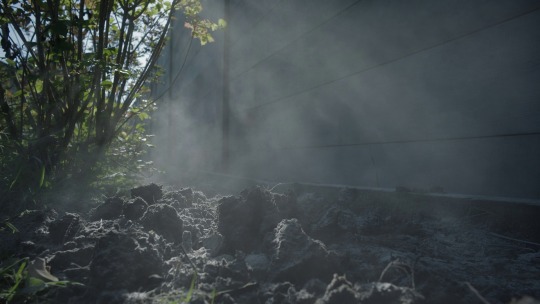
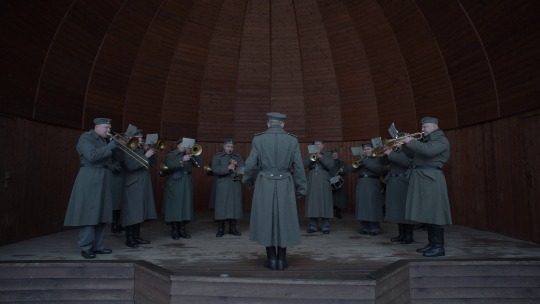
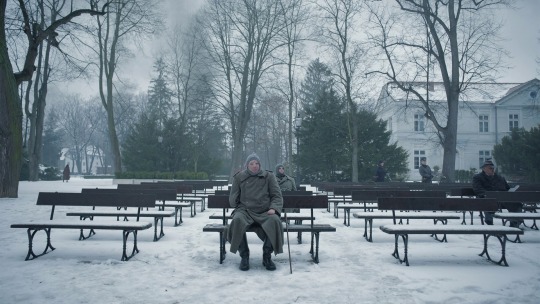


The Zone of Interest
Jonathan Glazer
2023
stills by filmgrab
#martin amis#the zone of interest#jonathan glazer#cinema#movies#film#Łukasz Żal#literature#great cinematography#Sandra Hüller#Christian Friedel#Johnnie Burn#Mica Levi#masterpiece#great sound design
11 notes
·
View notes
Text
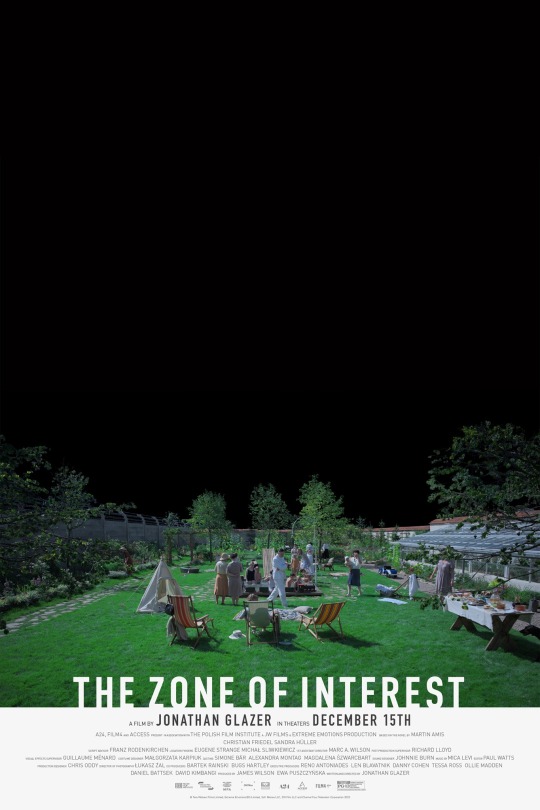
Films of 2023: The Zone of Interest (dir. Jonathan Glazer)
Grade: A-

#films of 2023#the zone of interest#jonathan glazer#sandra huller#christian friedel#some ruthless editing work in this#one of the most tender and several of the most stomach churning moments of the year#glazer and Scorsese clearing the shelves at the risky ending store#mica levi
3 notes
·
View notes
Text
youtube
music at the beginning of the film The Zone of Interest
film review
1 note
·
View note